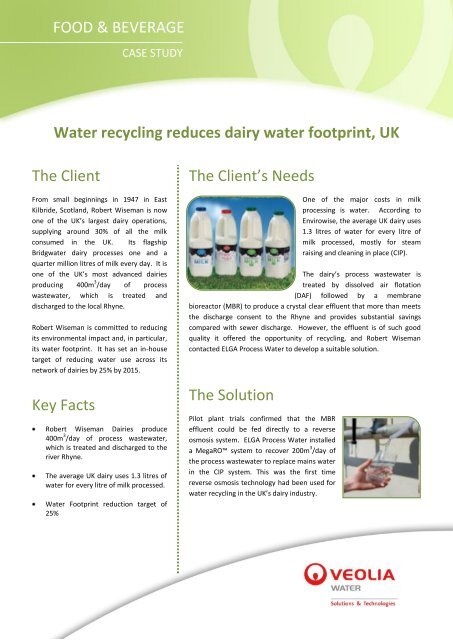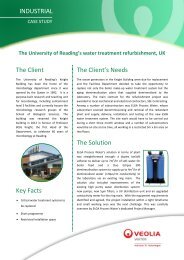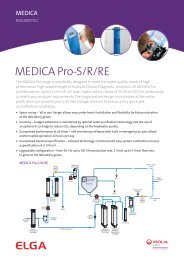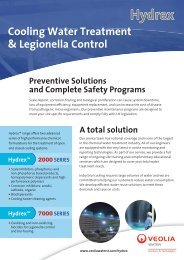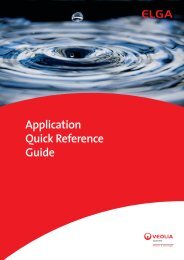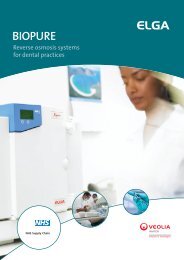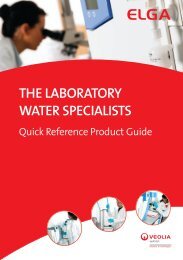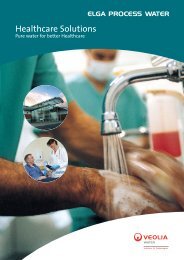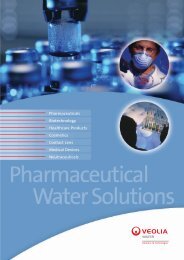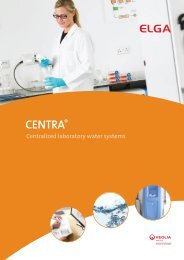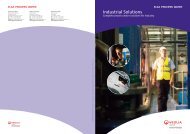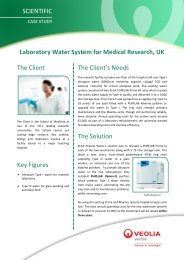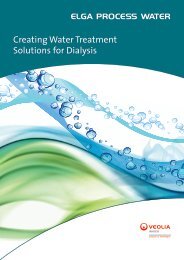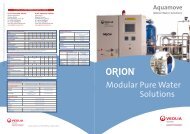Download case study (PDF) - Elga Process Water
Download case study (PDF) - Elga Process Water
Download case study (PDF) - Elga Process Water
Create successful ePaper yourself
Turn your PDF publications into a flip-book with our unique Google optimized e-Paper software.
FOOD & BEVERAGE<br />
CASE STUDY<br />
<strong>Water</strong> recycling reduces dairy water footprint, UK<br />
The Client<br />
From small beginnings in 1947 in East<br />
Kilbride, Scotland, Robert Wiseman is now<br />
one of the UK’s largest dairy operations,<br />
supplying around 30% of all the milk<br />
consumed in the UK. Its flagship<br />
Bridgwater dairy processes one and a<br />
quarter million litres of milk every day. It is<br />
one of the UK’s most advanced dairies<br />
producing 400m 3 /day of process<br />
wastewater, which is treated and<br />
discharged to the local Rhyne.<br />
Robert Wiseman is committed to reducing<br />
its environmental impact and, in particular,<br />
its water footprint. It has set an in-house<br />
target of reducing water use across its<br />
network of dairies by 25% by 2015.<br />
Key Facts<br />
Robert Wiseman Dairies produce<br />
400m 3 /day of process wastewater,<br />
which is treated and discharged to the<br />
river Rhyne.<br />
The average UK dairy uses 1.3 litres of<br />
water for every litre of milk processed.<br />
<strong>Water</strong> Footprint reduction target of<br />
25%<br />
The Client’s Needs<br />
One of the major costs in milk<br />
processing is water. According to<br />
Envirowise, the average UK dairy uses<br />
1.3 litres of water for every litre of<br />
milk processed, mostly for steam<br />
raising and cleaning in place (CIP).<br />
The dairy’s process wastewater is<br />
treated by dissolved air flotation<br />
(DAF) followed by a membrane<br />
bioreactor (MBR) to produce a crystal clear effluent that more than meets<br />
the discharge consent to the Rhyne and provides substantial savings<br />
compared with sewer discharge. However, the effluent is of such good<br />
quality it offered the opportunity of recycling, and Robert Wiseman<br />
contacted ELGA <strong>Process</strong> <strong>Water</strong> to develop a suitable solution.<br />
The Solution<br />
Pilot plant trials confirmed that the MBR<br />
effluent could be fed directly to a reverse<br />
osmosis system. ELGA <strong>Process</strong> <strong>Water</strong> installed<br />
a MegaRO system to recover 200m 3 /day of<br />
the process wastewater to replace mains water<br />
in the CIP system. This was the first time<br />
reverse osmosis technology had been used for<br />
water recycling in the UK’s dairy industry.
05.10.2012<br />
FOOD & BEVERAGE<br />
CASE STUDY<br />
<strong>Process</strong> Description<br />
Pilot plant trials confirmed that the MBR effluent could be fed directly to an ELGA<br />
<strong>Process</strong> <strong>Water</strong> MegaRO system, so the diary industry’s first reverse osmosis recycle<br />
system was installed to recover 200m 3 /day of the process wastewater to replace mains<br />
water in the CIP system.<br />
ELGA <strong>Process</strong> <strong>Water</strong>’s MegaRO reverse osmosis technology uses a membrane to<br />
remove 99% of residual COD, dissolved salts and bacteria from the treated process<br />
wastewater, producing water of equal or better quality, than the mains supply. The<br />
MegaRO’s low pressure membranes and high efficiency pumps make it one of the<br />
most energy efficient plants on the market. Low energy use means not only reduced<br />
carbon emissions but also low operating costs.<br />
MegaRO<br />
The MegaRO TM runs continuously and the permeate is chlorinated and stored for use in CIP. The quality of the waste<br />
concentrate stream is still good enough for discharge direct to the Rhyne.<br />
The Benefits<br />
The operating cost of the MegaRO is low; the recovered water actually costs less than mains water even after including<br />
capital amortisation. The net savings on the reduction in mains water consumption means that the new plant will give a<br />
payback in only two and half years. Having seen the environmental and economic benefits of recycling process wastewater,<br />
Robert Wiseman Dairies are planning to install combined effluent treatment and recycling systems at some of their other<br />
dairies where process wastewater is currently discharged direct to sewer.<br />
Results<br />
The diary industry’s first reverse osmosis recycle system was installed to recover<br />
200m 3 /day of the process wastewater to replace mains water in the CIP system.<br />
Return on investment achieved in approximately 2 ½ years<br />
For further information:<br />
ELGA <strong>Process</strong> <strong>Water</strong><br />
www.elgaprocesswater.co.uk<br />
sales.uk@veoliawater.com<br />
+ 44 (0) 1628 897 000


